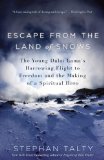Summary | Excerpt | Reviews | Beyond the Book | Readalikes | Genres & Themes | Author Bio
The Young Dalai Lama's Harrowing Flight to Freedom and the Making of a Spiritual Hero

Critics' Opinion:
Readers' Opinion:
First Published:
Jan 2011, 320 pages
Paperback:
Jan 2011, 320 pages
 Book Reviewed by:
Book Reviewed by:
Jo Perry
Buy This Book
Excerpt
Escape from the Land of Snows
Early one morning in March 1959, His Holiness the Fourteenth Dalai Lama walked slowly along a gravel path that led away from his small home at the Norbulingka, his beloved summer palace. The air just after first light still carried a snap of cold that reached from the Himalayas, and the sun was only now beginning to warm the breeze. This was his favorite time to walk the grounds, after rising for prayers and breakfast at 5:00 a.m., when everything was still. Against a sky beginning to lighten, the leaves of the palace trees— poplar and willow, mostly— fairly pulsed green. It was the Dalai Lama’s lucky color.
He was deep in thought, and then deep in the effort to avoid thinking. When he lifted his head he could spot thrushes and willow warblers and even an English kingfisher as they swung through the branches and then out over the two thick walls that surrounded the palace’s 160 acres. The Norbulingka, three miles outside the capital city, Lhasa, was the place the Dalai Lama felt most at home.
As the Dalai Lama walked, he could hear the calls of his pet monkey, which was tethered to a stick in another part of the Jewel Park. If he was lucky, he would spot the musk deer that roamed the grounds, along with cranes, a Mongolian camel, and high-stepping peacocks. He could also hear the occasional burst of gunfire that echoed outside the walls. Out there, thousands of his fellow Tibetans were camped, guarding against what they thought were conspiracies to kill or abduct him. There were, the Dalai Lama was convinced, no conspiracies, but that didn’t change the power or the direction of the uprising that was gathering in the streets of Lhasa. The crowds would not let him leave, and their very presence was inciting the Chinese, who had occupied the country, or retaken it from a corrupt, intriguing elite, if you asked them, nine years earlier.
The past few days, since the uprising had begun, had run together in a “dizzying, frightening blur.” The Norbulingka couldn’t have appeared more serene as it took on its new greenery, but it seemed that the future of Tibet was spinning out of control just outside its walls. The Dalai Lama felt that he was caught “between two volcanoes.” But there were actually more than two sides; the Tibetans themselves were divided. As was his own mind, particularly on the question of what to do now: stay in Lhasa, or flee to a safe haven in the south, or even on to India itself?
As the thin monk, just twenty-three years old, usually luminous with energy, paced slowly along the path, he was successfully avoiding returning to his small whitewashed palace, especially the Audience Hall, where he held his meetings. (It was even furnished with chairs and tables instead of Tibetan cushions, as an optimistic nod to the foreign diplomats he’d hoped to welcome, but the Chinese allowed few visitors.) Bad news was all that arrived there these days. The Chinese official Tan Guansan, one of the leading officials on the influential Tibet Work Commission, had made a point of coming to see him over the past few months, and the confrontations had become increasingly ugly. And for months the Dalai Lama had been receiving messengers arriving from Lhasa and beyond with stories of Chinese atrocities against his people— beheadings, disembowelments, accounts of monasteries burned with monks inside them— that were so outlandishly brutal that he had to admit he himself didn’t believe them all. “They were almost beyond the capacity of my imagination,” the Dalai Lama remembered. It simply wasn’t possible for human beings to treat one another that way. Now new reports were coming in daily through the gates of the Norbulingka, watched not only by his bodyguards and Tibetan army troops but also by representatives of “the people’s committee,” a bewildering concept in Tibet, which had been ruled for centuries by aristocrats and abbots, under the authority of the Dalai Lama himself. These bulletins told him that the Chinese were bringing artillery and reinforcements into Lhasa and installing snipers on the rooftops of his restive city. He could sometimes feel the rumble of tanks’ diesel engines as the vehicles negotiated the narrow streets.
Excerpted from Escape from the Land of Snows by Stephan TaltyCopyright © 2010 by Stephan Talty. Excerpted by permission of Crown, a division of Random House, Inc. All rights reserved. No part of this excerpt may be reproduced or reprinted without permission in writing from the publisher.





The Funeral Cryer by Wenyan Lu
Debut novelist Wenyan Lu brings us this witty yet profound story about one woman's midlife reawakening in contemporary rural China.
Your guide toexceptional books
BookBrowse seeks out and recommends the best in contemporary fiction and nonfiction—books that not only engage and entertain but also deepen our understanding of ourselves and the world around us.